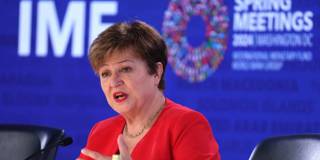In addition to creating an obvious conflict of interest, the European-dominated process of selecting the International Monetary Fund’s managing director has become a major obstacle to the institution’s mission. Though Europeans made the right choice this time, an overhaul is urgently needed.
OXFORD – Kristalina Georgieva’s reappointment as managing director of the International Monetary Fund is a welcome development, but it also highlights a major flaw in the IMF’s governance structure. In a world reeling from debt crises, violent conflict, climate change, and the lingering effects of the COVID-19 pandemic, the Fund’s importance is difficult to overstate. But to fulfill its proper role, it must be accountable to all member states, not just the powerful countries that currently wield disproportionate influence.

OXFORD – Kristalina Georgieva’s reappointment as managing director of the International Monetary Fund is a welcome development, but it also highlights a major flaw in the IMF’s governance structure. In a world reeling from debt crises, violent conflict, climate change, and the lingering effects of the COVID-19 pandemic, the Fund’s importance is difficult to overstate. But to fulfill its proper role, it must be accountable to all member states, not just the powerful countries that currently wield disproportionate influence.